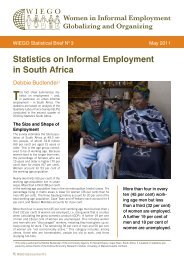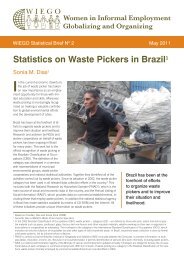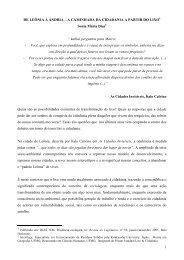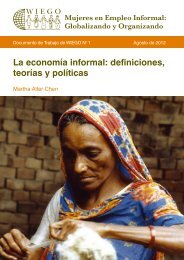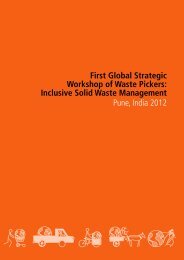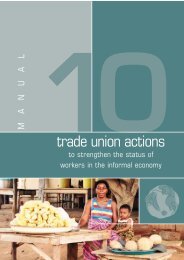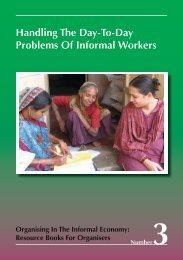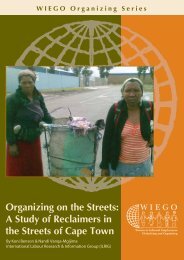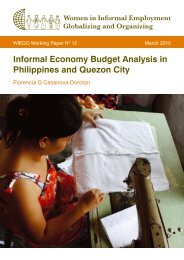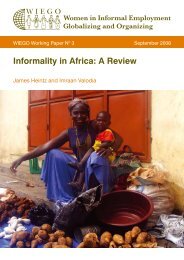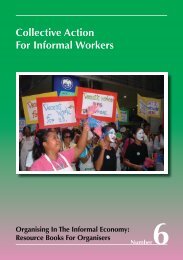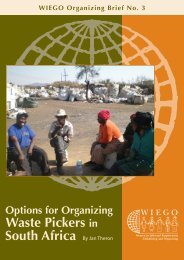Waste Pickers and Carbon Finance: Issues to Consider - WIEGO
Waste Pickers and Carbon Finance: Issues to Consider - WIEGO
Waste Pickers and Carbon Finance: Issues to Consider - WIEGO
- No tags were found...
You also want an ePaper? Increase the reach of your titles
YUMPU automatically turns print PDFs into web optimized ePapers that Google loves.
Executive Summary<strong>WIEGO</strong> Technical Brief (Urban Policies) N o 7<strong>Carbon</strong> finance has been cited as a potential source of income for membership-based organizations(MBOs) of informal waste pickers. However, it is important <strong>to</strong> underst<strong>and</strong> issues related <strong>to</strong> carbon offsettrading before proceeding. Some of the main issues arising from this research in<strong>to</strong> the feasibility of MBOspursuing carbon finance include:• The development of carbon offset projects is complex, technical, <strong>and</strong> costly, <strong>and</strong> it would be beyond thecapacity of many waste picker MBOs <strong>to</strong> develop, <strong>and</strong> possibly manage, these types of projects withoutexternal support.• There are technical issues around “additionality” that some waste picker MBOs, due <strong>to</strong> the contexts inwhich they work, may not be able <strong>to</strong> overcome.• The market for carbon credits is weak, which has implications for the commercial viability of new carbonoffset projects.• Important ethical issues surround carbon finance that MBOs may want <strong>to</strong> take in<strong>to</strong> consideration.• Other potential sources of income may be more straightforward for waste picker MBOs <strong>to</strong> pursue, includingpublic <strong>and</strong> private climate funding <strong>and</strong> Corporate Social Responsibility (CSR) arrangements.• MBOs should also be proactive in relation <strong>to</strong> the development of the Green Climate Fund as a potentialfuture source of funding, in pursuing waste management contracts with municipal authorities, <strong>and</strong>investing in innovation.A Word about the Naming DebateThe millions of people worldwide who make a living collecting, sorting, recycling, <strong>and</strong> selling materials thatsomeone else has thrown away are referred <strong>to</strong> by many different terms in different regions. These includescavengers, recyclers, reclaimers, ragpickers, binners, <strong>and</strong> waste pickers. At the First World Conferenceof <strong>Waste</strong> <strong>Pickers</strong>, held in Colombia in 2008, a provisional consensus was reached <strong>to</strong> use the generic term“waste picker” in English (but, in specific contexts, <strong>to</strong> use the term preferred by the local waste pickingcommunity). While an international consensus is still <strong>to</strong> be reached among activists, waste specialists,MBOs <strong>and</strong> non-governmental organizations (NGOs), the term waste pickers has been adopted <strong>and</strong> put in<strong>to</strong>use by <strong>WIEGO</strong> as a useful generic term that suits the purposes of current global networking. In the contextswhere specific terms have been agreed upon <strong>WIEGO</strong> uses the local term.– Sonia Maria Dias, <strong>WIEGO</strong>’s <strong>Waste</strong> Picker Specialist1




